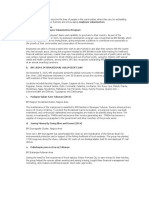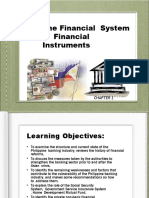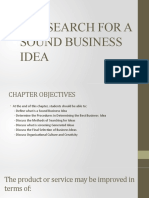Managing Franchise Relationship
Managing Franchise Relationship
Uploaded by
Doc Wad Negrete DivinaflorCopyright:
Available Formats
Managing Franchise Relationship
Managing Franchise Relationship
Uploaded by
Doc Wad Negrete DivinaflorCopyright
Available Formats
Share this document
Did you find this document useful?
Is this content inappropriate?
Copyright:
Available Formats
Managing Franchise Relationship
Managing Franchise Relationship
Uploaded by
Doc Wad Negrete DivinaflorCopyright:
Available Formats
Managing Franchise Relationship
Learning Objectives
By the end of this chapter, you should be able to understand:
• Dynamics of franchisor-franchisee relationship.
• The various stages of relationship building process.
• How franchisor and franchisee can work together to create synergy.
• How should a franchisee coordinate and collaborate with other fellow
franchisees for learnings and replication of best practices.
• What are the reasons for franchisee to leave the franchise system.
Divinaflor, Edward N. Franchisor-Franchisee Relationship 1
Managing Franchise Relationship
Basics of Franchisor-Franchisee Relationship
„Franchise Relation‟ is a term used to describe the current relationship state
between a franchisor and a franchisee and is based on mutual respect and
trust, commitment to a common goal, understanding expectations and the
right culture fit.
Franchisors tend to rely on the contractual arrangement whereas franchisees
operate at a more personal level, thus affecting the roles played in the
partnership and the degree of power and control exerted.
Divinaflor, Edward N. Franchisor-Franchisee Relationship 2
Managing Franchise Relationship
Basics of Franchisor-Franchisee Relationship (continued)
• The franchisor expects the franchisee to follow the set business model as
per the franchise operations manual to run the business and achieve
success.
• These expectations are fairly uniform throughout all stages of the business.
• However, for a franchisee, some of the expectations keep changing at
different stages of the business and need to be managed.
Divinaflor, Edward N. Franchisor-Franchisee Relationship 3
Managing Franchise Relationship
Basics of Franchisor-Franchisee Relationship (continued)
• Evaluation: Franchisee appreciates the franchisor & considers him an
expert.
• Before launch: Franchisee owner is in a learning phase.
• During launch: Franchisee is dependent on the franchisor for support and
guidance.
• Post launch: Franchisee develops confidence in business as well as self.
• Early operations: Business streamlines and franchisee becomes more
independent and often develops an ego.
• Regular operations: Resentment sets in with the franchisee questioning
the value addition by the franchisor.
• Mature operations: With time and mature operations, franchisee learns to
play win-win with interdependence.
Divinaflor, Edward N. Franchisor-Franchisee Relationship 4
Managing Franchise Relationship
Basics of Franchisor-Franchisee Relationship (continued)
An effective franchisor-franchisee relationship can be achieved when:
• Both the franchisor and the franchisee work harmoniously together.
• Respect each other.
• Appreciate and accept the efforts and roles each has to play in their
respective success.
• Recognize their dependency on each other and engaging in a symbiotic
relationship.
• Operate their businesses with integrity and with the highest standards.
• Put forth their best effort to preserve and nurture their special relationship
to enable both of them to achieve more than their intended objectives.
Divinaflor, Edward N. Franchisor-Franchisee Relationship 5
Managing Franchise Relationship
Dynamics of Franchisor-Franchisee Relationship
• Franchisees have more incentive and tendency to “free ride”.
• They tend to take an advantage of the positive effects of the franchisor‟s
investment, such as brand, quality standards, advertising and marketing,
while minimising investments of their own.
• Also, in some cases, even franchisors engage in unfair practices by
encroaching on franchisee territories, misuse of the cooperative advertising
budget or giving unfair advantage and support to company owned outlets
and select franchisees.
• Some franchisors exercise an unfair bargaining power over franchisees and
at times even threaten to terminate the agreement unilaterally.
Divinaflor, Edward N. Franchisor-Franchisee Relationship 6
Managing Franchise Relationship
Dynamics of Franchisor-Franchisee Relationship (continued)
• From a game theory perspective, both the parties have an incentive to
behave opportunistically.
• Initially, such behaviour goes unnoticed but with repetition, the other party
also gets into an act of non-compliance on the grey areas mentioned in the
agreement.
• This not only erodes the trust factor but also the deteriorating relationship
takes a toll on the business performance.
Divinaflor, Edward N. Franchisor-Franchisee Relationship 7
Managing Franchise Relationship
Conflict Management
• If the friction between the franchisors and franchisees is not addressed in the
beginning, it could cause a rift between them and severance of relationship.
• Matters become worse when franchisors turn blind eye to the problems.
• Conflict is not totally unhealthy, however, when it grows and reaches the court,
it drains time, talent and money from the franchise system and conflict at that
level, seldom results in a healthy relationship.
• Both the parties need to understand and carry out their respective roles by
sharing a vision, maintaining professionalism, support, training and an open
communication.
• The Franchisor is the „senior‟ in the franchisor-franchisee relationship and must
take responsibility to make this relationship effective.
Divinaflor, Edward N. Franchisor-Franchisee Relationship 8
Managing Franchise Relationship
Conflict Management (continued)
Some of the key areas of conflict between franchisors and franchisees include:
• Low spends on regional marketing activities or higher fee demanded by franchisor.
• Non-adherence to geographical exclusivity or reduced area of operation.
• Lack of support and empathy or non-professional approach by franchisor
employees.
• Inadequate handholding during initial stages of operation.
• Lack of training support or poor quality of training.
• Unclear policies or frequent policy changes by franchisors protecting only their
interests.
• Franchisees not consulted and no feedback taken while framing new policies.
• Lack of effective communication between franchisor and franchisee.
• Rumour mongering, price cutting, trespassing territories amongst franchisees.
Divinaflor, Edward N. Franchisor-Franchisee Relationship 9
Managing Franchise Relationship
Stages of Relationship Building Process
The franchisor-franchisee relationship life cycle goes through four stages:
1. Independence Stage (“You” and “I” Stage)
• Both are independent of each other.
• Both independently look out for growth opportunities for individual business
development.
2. Dependence Stage (“You” Stage)
• Both come together and enter into a formal franchise agreement which
expects each one to discharge its contractual obligations in letter and spirit.
• Business gets established and then grows rapidly.
Divinaflor, Edward N. Franchisor-Franchisee Relationship 10
Managing Franchise Relationship
Stages of Relationship Building Process (continued)
The franchisor-franchisee relationship life cycle goes through four stages:
3. Quasi-Dependence Stage (“I” Stage)
• There is a higher expectation of each party to extract more from the other
party leading to poor compliance, eroding trust and each party claiming the
credit for the success.
4. Interdependence Stage (“We” Stage)
• They discuss issues amicably and arrive at mutually acceptable solutions.
• The mindset shifts from “what minimum has to be done” to “what maximum
can be done”.
• This feeling manifests itself in various ways opening up opportunities of growth
for both the parties.
Divinaflor, Edward N. Franchisor-Franchisee Relationship 11
Managing Franchise Relationship
Working Together for a Symbiotic Relationship
• Franchising is a combination of business relationship and human
relationship.
• Success is dependent upon developing these relationships with a conscious
effort.
• This is same like the parent-child relationship.
• If this relationship is nurtured well and it develops into a symbiotic
relationship, it can create a win-win situation for both parties.
• This relationship requires an on-going commitment, with each party
expected to uphold its end of the bargain through common goals, active
communication, cooperation, mutual respect and trust.
Divinaflor, Edward N. Franchisor-Franchisee Relationship 12
Managing Franchise Relationship
Importance of Trust in Building Relationship
• Trust is a vital element in a successful franchise relationship; both at an
individual level and also for the whole network.
• Mutual trust helps to override issues or problems that arise in the day to
day operations.
• Rather than opportunistic behaviour, each of the parties needs to adopt a
long-term approach by building trust and strengthening the relationship for
synergy.
• This allows mutual accommodation and a highly-useful alternative to a
legalistic approach to strategic planning and day-to-day management.
Divinaflor, Edward N. Franchisor-Franchisee Relationship 13
Managing Franchise Relationship
Importance of Trust in Building Relationship (continued)
• Trust if blended appropriately with the carefully articulated clauses of the
franchisee agreement can go a long way in the success of each party.
• Trust is a two-way street and either party in the relationship can build or
destroy it.
• Franchisor being senior in the relationship must take initiatives to establish
and also enhance trust.
• Franchisee also must admit mistakes and take actions to avoid recurrence
with sincere efforts.
Divinaflor, Edward N. Franchisor-Franchisee Relationship 14
Managing Franchise Relationship
Growing Together with other Fellow Franchisees
• Franchisee must build relationships with other fellow franchisees of the brand for
synergy, sharing best practices, cross-pollination of ideas and growing together.
• The strengths of individual members, combined with exceptional systems, processes
and industry experience can allow collaborative franchisees to uphold exceptional
standards for excellence in service, quality and experience for the customer.
• The collective sum, from both a financial and experience perspective, makes the
franchisee group exponentially more effective than individual owners.
• Collaborating with fellow franchisees gives the business an edge by learning from
the success stories and also the mistakes of other business owners.
• The franchisor must also facilitate the collaborative efforts of the franchisees by
creating opportunities for the franchisees to come together to share and harvest
their collective intellect, experiences and business wisdom.
Divinaflor, Edward N. Franchisor-Franchisee Relationship 15
Managing Franchise Relationship
Franchisee Attrition
• If the expectations on financial returns or franchisor support in business
are not met, there is bound to be strain in the relationship and may lead to
the franchisee leaving the system.
• In some cases, franchisee has to leave due to personal problems including
a change in their ownership or possession of properties or due to any
regulatory issues.
• At times, franchisees also leave if they find other more lucrative business
opportunity which can fetch higher returns.
• Some ambitious franchisees also consider an exit and then renter as a
franchisor by creating a brand of their own.
Divinaflor, Edward N. Franchisor-Franchisee Relationship 16
You might also like
- Bir Ruling No. Ot-179-2022 - Franchisee Ewt Rules - LocalDocument5 pagesBir Ruling No. Ot-179-2022 - Franchisee Ewt Rules - LocalJohnallen MarillaNo ratings yet
- Pricing Strategy: Setting Price Levels, Managing Price Discounts, & Establishing Price StructuresDocument24 pagesPricing Strategy: Setting Price Levels, Managing Price Discounts, & Establishing Price StructuresDr. Sartaj KheraNo ratings yet
- Go, J. (2017) - Principles and Practices in Marketing in The Philippine SettingDocument2 pagesGo, J. (2017) - Principles and Practices in Marketing in The Philippine SettingKimberly HipolitoNo ratings yet
- Distribution Management in 21st CenturyDocument17 pagesDistribution Management in 21st Centuryjeon jungkookNo ratings yet
- Key Franchising PoliciesDocument10 pagesKey Franchising PoliciesBusiness Permit100% (2)
- Chapter 6 Franchise QDocument20 pagesChapter 6 Franchise QViễn Phương25% (4)
- Chapter 3 Strategic Prospecting and Preparing For Sales DialogueDocument32 pagesChapter 3 Strategic Prospecting and Preparing For Sales DialogueElla OblinadaNo ratings yet
- Bond ExercisesDocument1 pageBond ExercisesElsa EstrellitaNo ratings yet
- Chapter 3 - Selling On The WebDocument49 pagesChapter 3 - Selling On The WebDanGrutas100% (1)
- Fundamentals of Strategic ManagementDocument52 pagesFundamentals of Strategic ManagementGennelyn Grace PenaredondoNo ratings yet
- Chapter 7 and 8 Group of PASDocument18 pagesChapter 7 and 8 Group of PASDavid alfonsoNo ratings yet
- SY1920 1st Sem ACCO4083 - 3rd EvaluationDocument9 pagesSY1920 1st Sem ACCO4083 - 3rd EvaluationPaul Adriel BalmesNo ratings yet
- BAE 3 (Chapter 2 - Recognizing Franchising Opportunities)Document11 pagesBAE 3 (Chapter 2 - Recognizing Franchising Opportunities)Studywell100% (1)
- Chapter 11 - The Franchising RelationshipDocument20 pagesChapter 11 - The Franchising RelationshipHoon Yi YangNo ratings yet
- Lesson 1 Introduction To Distribution ManagementDocument36 pagesLesson 1 Introduction To Distribution ManagementDennis PerezNo ratings yet
- FranchisingDocument90 pagesFranchisingEmmalyn Joyce SalazarNo ratings yet
- Franchisor Management: Organization and Administrative PolicyDocument6 pagesFranchisor Management: Organization and Administrative PolicyQueenie Domingo0% (1)
- Lecture 4 - Evaluating Competition in RetailingDocument39 pagesLecture 4 - Evaluating Competition in Retailingjefribasiuni1517No ratings yet
- Online Consumer Behavior, Market Research, and AdvertisementDocument40 pagesOnline Consumer Behavior, Market Research, and AdvertisementJenneey D Rajani100% (1)
- Mary Ann RodriguezDocument15 pagesMary Ann RodriguezIngrid NavarroNo ratings yet
- Unit III - SALES PRE-APPROACH & APPROACHDocument6 pagesUnit III - SALES PRE-APPROACH & APPROACHLance Reyes AguilarNo ratings yet
- Franchising Business Plan FormatDocument38 pagesFranchising Business Plan FormatJane SuNo ratings yet
- Chapter 1 and 2 Book Summary Consumer BehaviorDocument8 pagesChapter 1 and 2 Book Summary Consumer BehaviorMr. Asif Hanif QureshiNo ratings yet
- History of PNBDocument2 pagesHistory of PNBAlliah SomidoNo ratings yet
- BPI Undertake Initiatives That Help Improve The Lives of People in The Communities Where They AreDocument7 pagesBPI Undertake Initiatives That Help Improve The Lives of People in The Communities Where They AreJann Aldrin PulaNo ratings yet
- Ch.13 Managing Small Business FinanceDocument5 pagesCh.13 Managing Small Business FinanceBaesick MoviesNo ratings yet
- InnopreneurshipDocument9 pagesInnopreneurshipmarissa casareno almuete100% (1)
- QUIZ 1 Distribution ManagementDocument1 pageQUIZ 1 Distribution ManagementDan Navarro100% (1)
- Professional Salesmanship (Prosale) : Lesson 1: Salesmanship: Its Nature and RewardsDocument19 pagesProfessional Salesmanship (Prosale) : Lesson 1: Salesmanship: Its Nature and RewardsjoshuaNo ratings yet
- The History and Evolution of FranchisingDocument4 pagesThe History and Evolution of FranchisingJONATHANNo ratings yet
- Account Receivable and Inventory ManagementDocument56 pagesAccount Receivable and Inventory ManagementAbu Bakar Rajpoot100% (4)
- Report in SalesmanshipDocument17 pagesReport in SalesmanshipMark Jerald RamirezNo ratings yet
- Financial Statement Based On PASDocument18 pagesFinancial Statement Based On PASJR AcibarNo ratings yet
- Chapter 2 - Retail Strategic Planning and Operations ManagementDocument23 pagesChapter 2 - Retail Strategic Planning and Operations ManagementLoren SalanguitNo ratings yet
- Importance of Consumer Behavior in MarketingDocument9 pagesImportance of Consumer Behavior in MarketingRamesh PandeyNo ratings yet
- How The Household Influence Consumer BehaviourDocument64 pagesHow The Household Influence Consumer BehaviourAshutosh Singh100% (2)
- 4.1 Debt and Equity FinancingDocument13 pages4.1 Debt and Equity FinancingAliza UrtalNo ratings yet
- Chapter 7 The Financial EnvironmentDocument25 pagesChapter 7 The Financial EnvironmentEunice NunezNo ratings yet
- Special Topics in Financial ManagementDocument3 pagesSpecial Topics in Financial ManagementPaglinawan Al Kim100% (1)
- Case: We Are Market Basket: Far Eastern UniversityDocument9 pagesCase: We Are Market Basket: Far Eastern UniversityAmro Ahmed RazigNo ratings yet
- 01 - Marketing Management Course OutlineDocument8 pages01 - Marketing Management Course OutlineDA YenNo ratings yet
- Chapter 4Document15 pagesChapter 4Bien GolecruzNo ratings yet
- The Professional Salesman's CreedDocument2 pagesThe Professional Salesman's CreedabmaboocnecieboycNo ratings yet
- Evolution and Function of MoneyDocument16 pagesEvolution and Function of Moneys shaikhNo ratings yet
- CHAP - 5 - Lending Policies and Procedures - Managing Credit RiskDocument56 pagesCHAP - 5 - Lending Policies and Procedures - Managing Credit RiskTran Thanh Ngan0% (1)
- Chapter 2 Philippine Financial SystemDocument53 pagesChapter 2 Philippine Financial SystemmeyvvNo ratings yet
- CaseDocument12 pagesCaseShankar ChaudharyNo ratings yet
- Ch3 DM - Components of Marketing ChannelsDocument8 pagesCh3 DM - Components of Marketing ChannelsJireh CrisheigneNo ratings yet
- Module 3 Organization and Registration of CooperativesDocument18 pagesModule 3 Organization and Registration of CooperativesArnie CasareoNo ratings yet
- Retail Management (MM4) Module 1Document15 pagesRetail Management (MM4) Module 1Nhiel Bryan BersaminaNo ratings yet
- Strategic Prospecting and Preparing For Sale Dialogue - Group 5Document30 pagesStrategic Prospecting and Preparing For Sale Dialogue - Group 5Ynah MundoNo ratings yet
- Chapter 8 The Credit SystemDocument20 pagesChapter 8 The Credit SystemJonavel Torres MacionNo ratings yet
- Entrep Learning Content 7Document8 pagesEntrep Learning Content 7ChristyNo ratings yet
- Chapter 3A. Components of Marketing ChannelsDocument48 pagesChapter 3A. Components of Marketing ChannelsJede LaderNo ratings yet
- Module 2 - Product in Theory and PracticeDocument8 pagesModule 2 - Product in Theory and PracticeRonald Reagan AlonzoNo ratings yet
- Cebuana Term PapaerDocument8 pagesCebuana Term PapaerBea GonzalesNo ratings yet
- Special Topics in Financial ManagementDocument4 pagesSpecial Topics in Financial ManagementLaura AquinoNo ratings yet
- 5 The Search For A Sound Business Idea 1Document24 pages5 The Search For A Sound Business Idea 1Baila BakalNo ratings yet
- Chapter 5Document20 pagesChapter 5ShiMeiChanNo ratings yet
- Chapter 2 - Recognizing Franchising OportunitiesDocument27 pagesChapter 2 - Recognizing Franchising OportunitiesGuntherNo ratings yet
- Good Governance & Social ResponsibilityDocument23 pagesGood Governance & Social ResponsibilityCristy RamboyongNo ratings yet
- Franchising Lesson 7Document4 pagesFranchising Lesson 7Christel Mae S. BoseoNo ratings yet
- LESSON 2-1st QuarterDocument133 pagesLESSON 2-1st QuarterDoc Wad Negrete DivinaflorNo ratings yet
- Stages of Franshising RelationshipDocument5 pagesStages of Franshising RelationshipDoc Wad Negrete DivinaflorNo ratings yet
- Franchising Work. INTRAPRENEURSHIP IN FRANCHISING BUSINESSDocument5 pagesFranchising Work. INTRAPRENEURSHIP IN FRANCHISING BUSINESSDoc Wad Negrete DivinaflorNo ratings yet
- Issue in Franchising RelationshipDocument6 pagesIssue in Franchising RelationshipDoc Wad Negrete DivinaflorNo ratings yet
- Business Myth's About Ethics in BusinessDocument4 pagesBusiness Myth's About Ethics in BusinessDoc Wad Negrete Divinaflor100% (1)
- ENTREPmoduleDocument6 pagesENTREPmoduleElla MaxineNo ratings yet
- Ekart Franchise Starting GuideDocument9 pagesEkart Franchise Starting GuideSathva SeelanNo ratings yet
- Letter of IntentDocument3 pagesLetter of IntentSatish ChNo ratings yet
- Woodhouse v. HaliliDocument14 pagesWoodhouse v. HaliliKanraMendozaNo ratings yet
- MC Donalds PESTEL AnalysisDocument8 pagesMC Donalds PESTEL AnalysisMisbah ul Islam AndrabiNo ratings yet
- International Marketing Entry StrategiesDocument10 pagesInternational Marketing Entry Strategiesamitmonu1979100% (1)
- Front-Office Module FinalDocument80 pagesFront-Office Module FinalDharjen CuartoNo ratings yet
- Accessing Resources For Growth From External SourcesDocument14 pagesAccessing Resources For Growth From External SourcesHamza AdilNo ratings yet
- Strategic Formulation-Corporate and Business Level StrategiesDocument35 pagesStrategic Formulation-Corporate and Business Level StrategiesAshika MehtaNo ratings yet
- Employees or EntrepreneurDocument9 pagesEmployees or EntrepreneurMay CruzNo ratings yet
- Designing and Managing Integrated Marketing ChannelsDocument77 pagesDesigning and Managing Integrated Marketing ChannelsEucharistia Yacoba NugrahaNo ratings yet
- LASTIMOSA - Midterm Case - TACOBELLDocument13 pagesLASTIMOSA - Midterm Case - TACOBELLShiena Kate LastimosaNo ratings yet
- Mchdonalds AustraliaDocument9 pagesMchdonalds AustraliaMuhammad Yawar Ali SyedNo ratings yet
- Business Plan Erica Anne1Document28 pagesBusiness Plan Erica Anne1dancolico9No ratings yet
- Supply Chain Case Study - The Definitive GuideDocument10 pagesSupply Chain Case Study - The Definitive GuideSonaal GuptaNo ratings yet
- Cbme 2 Strategic Management: "Rocky Mountain Chocolate Factory Inc. "Document6 pagesCbme 2 Strategic Management: "Rocky Mountain Chocolate Factory Inc. "Gaelle CBNo ratings yet
- Panera BreadDocument2 pagesPanera BreadSharky Roxas100% (1)
- National Power Corp. v. CA 345 Phil. 9 1997Document26 pagesNational Power Corp. v. CA 345 Phil. 9 1997Ralf Vincent OcañadaNo ratings yet
- Competing in Global MarketsDocument38 pagesCompeting in Global MarketsjitukrNo ratings yet
- Businees Model Canvas MCD and Burger KingDocument8 pagesBusinees Model Canvas MCD and Burger KingMuhammad Choirul HudaNo ratings yet
- 7P Marketing Mix Starbucks 1 FrankDocument14 pages7P Marketing Mix Starbucks 1 FrankDuong Ha AnhNo ratings yet
- Consumer Protection ActDocument4 pagesConsumer Protection Actproject7No ratings yet
- Taxes: - Tax Forms - Tax Rates - Tax Implications On Depreciable AssetsDocument55 pagesTaxes: - Tax Forms - Tax Rates - Tax Implications On Depreciable AssetsZoloft Zithromax ProzacNo ratings yet
- Research ProjectDocument37 pagesResearch ProjectAE LLANo ratings yet
- (International Business Series (Boca Raton Fla.) ) Jonnard, Claude M - International Business and Trade - Theory, Practice, and policy-CRC Press (2019)Document305 pages(International Business Series (Boca Raton Fla.) ) Jonnard, Claude M - International Business and Trade - Theory, Practice, and policy-CRC Press (2019)KEREM ORKUN50% (2)
- Business ModelDocument10 pagesBusiness Modelalberto micheliniNo ratings yet
- Richard Francis 24 Chopin Avenue - DollardDocument2 pagesRichard Francis 24 Chopin Avenue - Dollardrichyrich3553No ratings yet
- Assignment 1 10-05Document9 pagesAssignment 1 10-05Azaan ProNo ratings yet






























































































